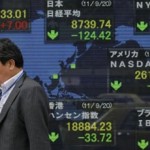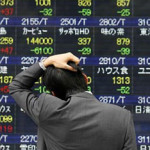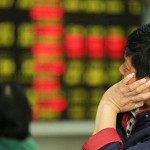Asian Stocks Retreat as Oil Falls With Copper; Yen Strengthens

-
Japanese currency advances after steepest drop since 2014
-
Crude retreats from five-month high; British pound gains
Asian shares were set for the first back-to-back declines in a month as commodities prices retreated and the yen strengthened, reflecting investor caution before central bank meetings this week in the U.S. and Japan.
All 10 industry groups lost ground on the MSCI Asia Pacific Index, which reached a four-month high last week. The yen climbed more than twice as much as any other major currency, after tumbling on Friday by the most since 2014. The British pound rose to a one-month high after U.S. President Barack Obama urged U.K. citizens to vote to remain part of the European Union in a June referendum. Crude dropped for the first time in a week and industrial metals declined. China’s interest-rate swaps climbed to a one-year high as improving economic data make monetary easing less likely.

While the Federal Reserve is expected to refrain from raising borrowing costs on Wednesday, investors will be on the lookout for any shifts in its guidance on the likely trajectory of increases. The Bank of Japan’s meeting concludes the following day and most economists predict monetary stimulus will be stepped up in Asia’s second-biggest economy. The U.S. and the euro area will report their first-quarter gross domestic products this week and earnings are due from companies including Apple Inc. as well as China’s largest banks.
“Market participants are looking for new drivers for risk this week,” Bernard Aw, a market strategist at IG Asia Pte. in Singapore, said by phone. “With the barrage of economic data and two major central meetings, there will not be a shortage of catalysts.”
The U.S. will release details of March new home sales on Monday, while gauges of business sentiment are due in the U.K. and Germany. Saudi Arabia is scheduled to unveil a plan to diversify its economy and shore up government finances after a slump in oil prices over the last two years. Financial markets in Australia and New Zealand are closed for the Anzac Day holiday.
Stocks
The MSCI Asia Pacific Index dropped 0.3 percent as of 2:07 p.m. Tokyo time, after sliding 0.8 percent on Friday. Japan’s Topix Index fell 0.5 percent, retreating from its highest close since early February, and benchmarks in Hong Kong, Shanghai and Singapore declined by at least 0.6 percent.
Sony Corp. slumped as much as 6.5 percent in Tokyo after the electronics maker said it won’t announce full-year forecasts when it reports earnings on Thursday as it is still assessing the damage from an earthquake that shut its main plant for camera sensors. Hanjin Shipping Co. plunged by a record 30 percent in Seoul after South Korea’s largest container carrier said it would seek to restructure its debt.
Futures on the Standard & Poor’s 500 Index fell 0.2 percent, while contracts on the U.K.’s FTSE 100 Index were little changed. Royal Philips NV reported first-quarter earnings.
Currencies
The yen strengthened 0.6 percent to 111.09, after sliding 2.1 percent on Friday as Bloomberg reported the Bank of Japan may consider helping banks lend by offering a negative rate on some loans. Goldman Sachs Group Inc. said it expects further monetary easing at this week’s policy meeting.
“The BOJ is already so long into ‘the reflationary trade’ that it has to continue to deliver further accommodation for the time being,” Goldman strategists Silvia Ardagna, Robin Brooks and Michael Cahill wrote in a report. Authorities will likely focus more on asset purchases than on interest-rate policy and the yen will probably weaken to 130 a dollar in a year, they said.
The pound rose 0.2 percent versus the dollar after Obama bolstered his warning to the British electorate against embracing a so-called Brexit from the European Union, saying it could take as long as 10 years before the U.K. and the U.S. negotiated a new trade agreement. South Korea’s won fell as much as 0.8 percent to a one-week low, leading declines among emerging-market currencies.
Commodities
The Bloomberg Commodity Index declined for a third day, extending its retreat from a five-month high reached last week.
Crude oil dropped 1.6 percent to $43.05 a barrel in New York. Saudi Arabian Oil Co. will complete an expansion of its Shaybah oilfield by the end of May, allowing the world’s largest exporter to maintain total capacity at 12 million barrels a day, according to two people with knowledge of the plan. Iran has increased output by 1 million barrels a day since sanctions were lifted in January, Shana reported, citing Oil Minister Bijan Namdar Zanganeh.
Copper fell 0.5 percent in London, snapping a five-day winning streak. Aluminum dropped 0.2 percent, after recording its best week in more than three years on the back of signs of improving demand in China, the top user.
“Metals are correcting from recent gains,” said Li Li, a Shenzhen-based analyst from Jinrui Futures Co. “Copper is probably reaching its peak and wide-ranging fluctuations are expected.”
Bonds
U.S. Treasuries due in a decade rose for the first time in six days, pushing their yield down by one basis point to 1.88 percent. The rate on similar-maturity Japanese government bonds increased by three basis points to negative 0.08 percent, the highest in more than two weeks.
One-year interest-rate swaps in China increased seven basis points to 2.63 percent, set for the highest close since April 2015. Recent Chinese indicators from a purchasers’ manufacturing index to credit growth have beaten estimates, lessening the need for monetary easing that risks fueling speculative trading in the nation’s commodities and property markets.
Source: Bloomberg





























